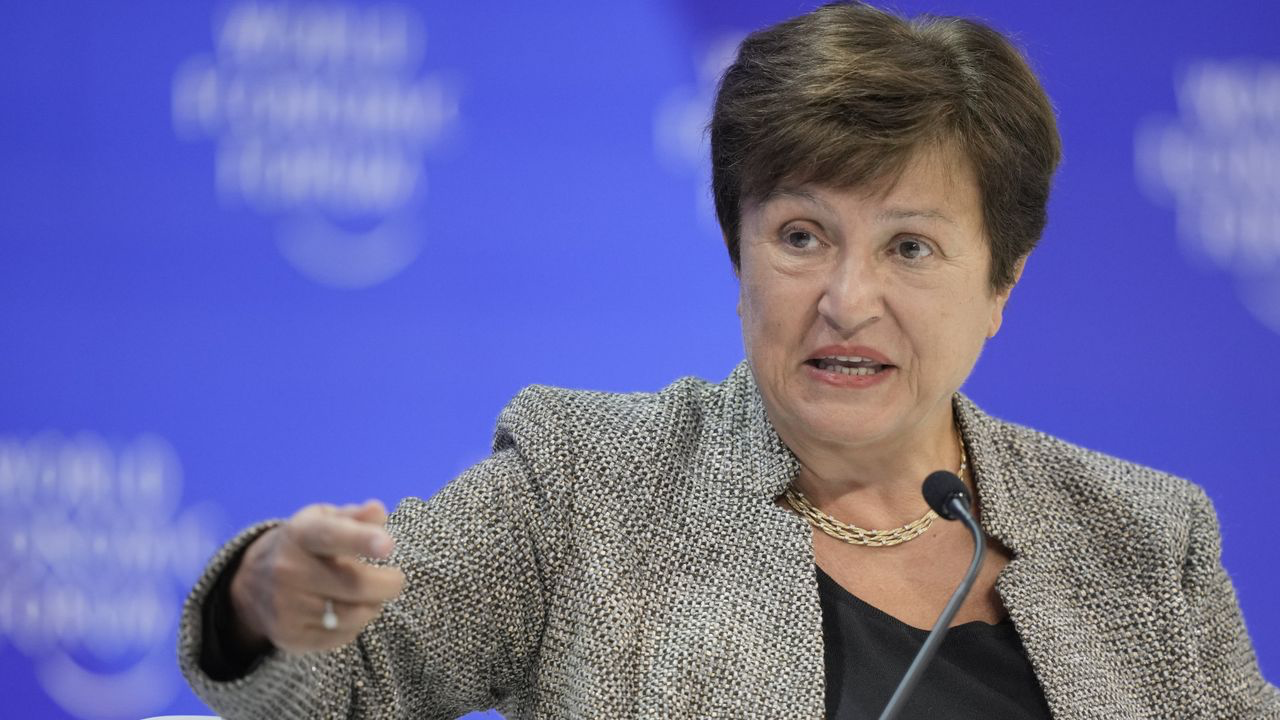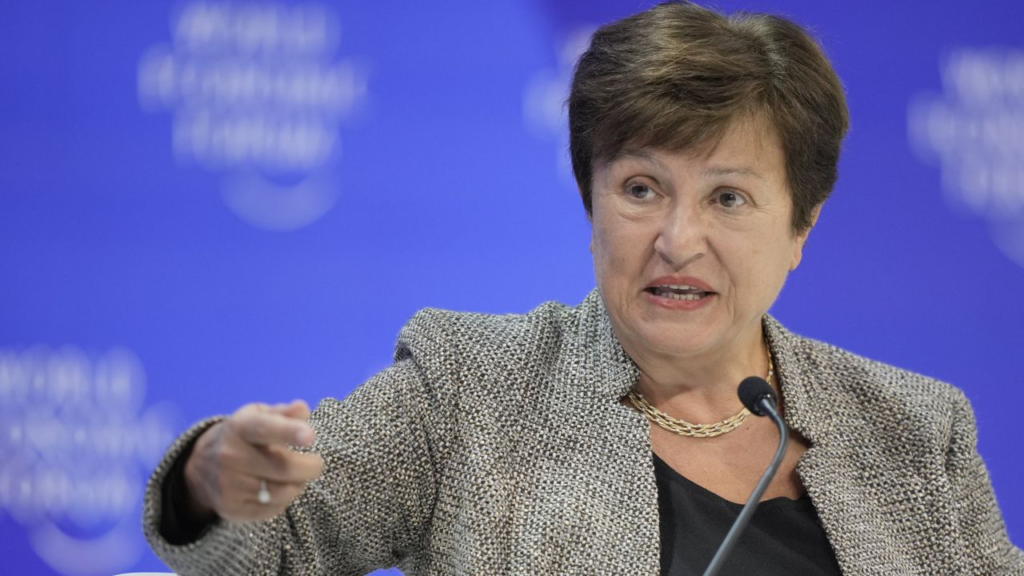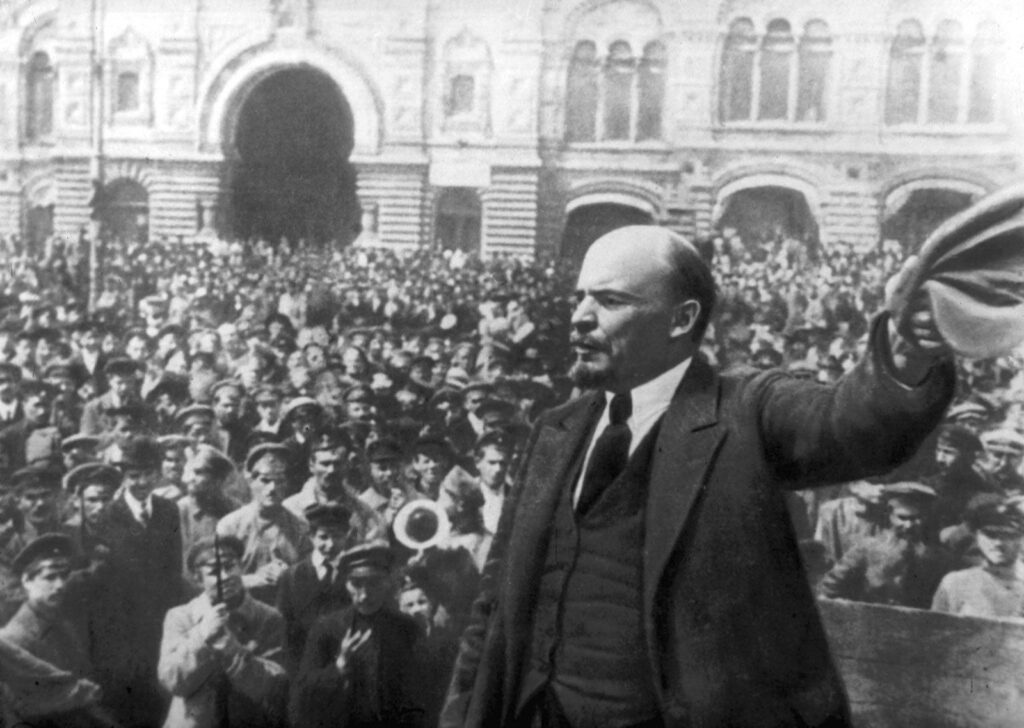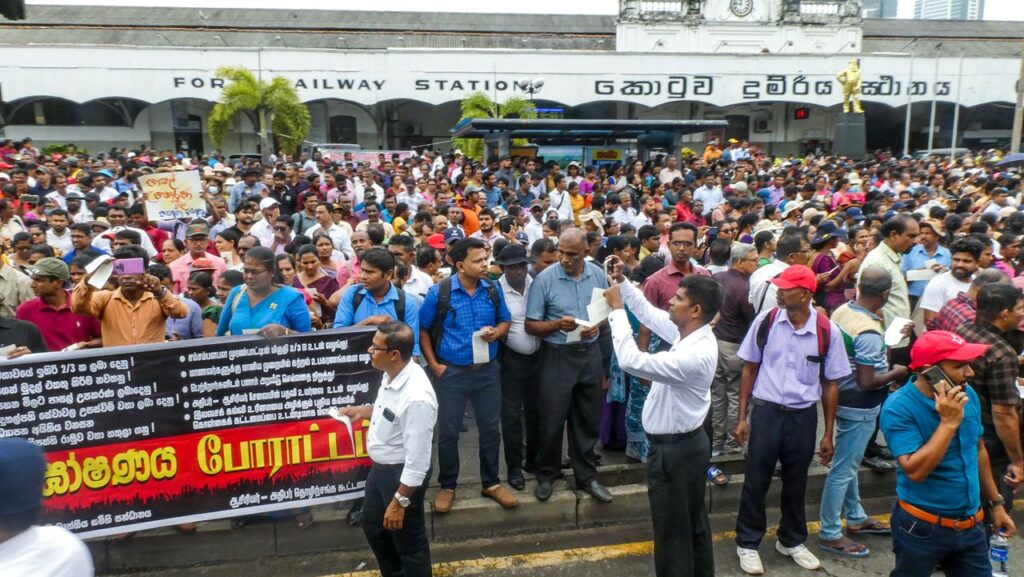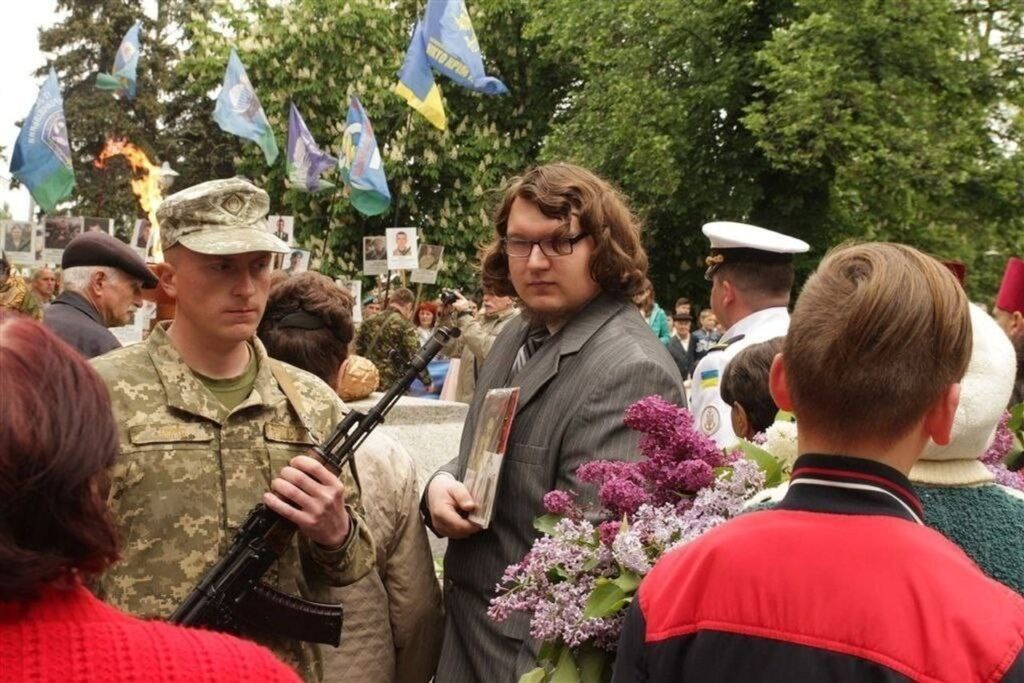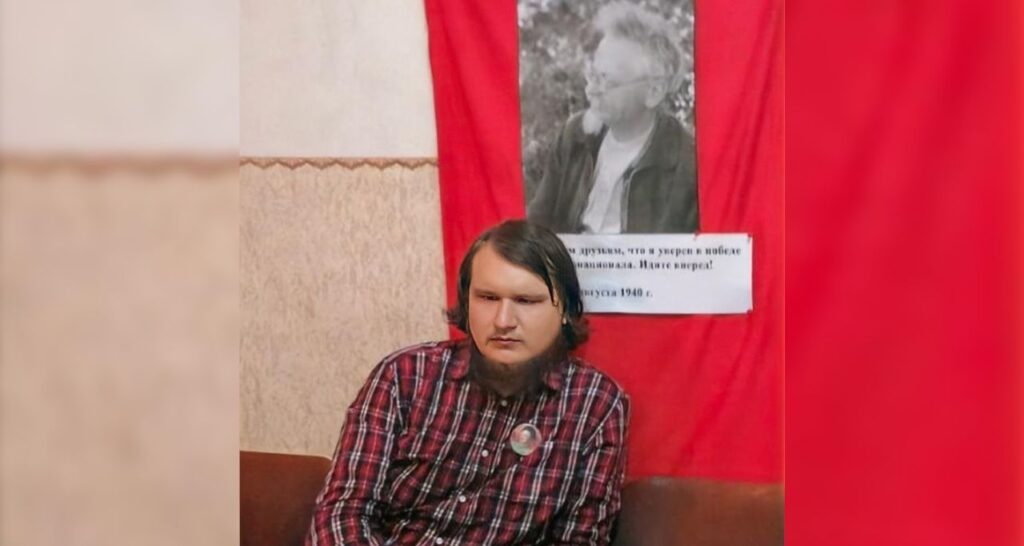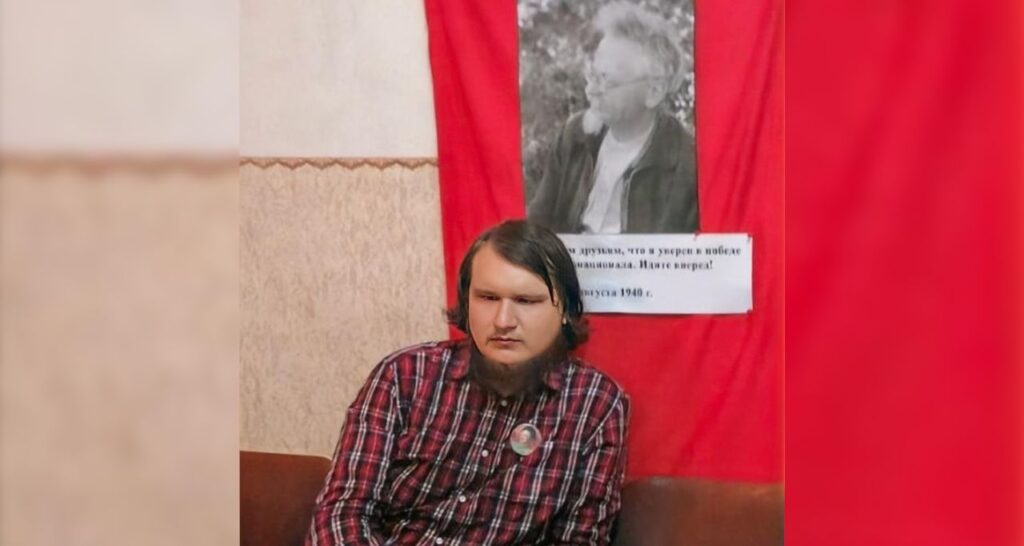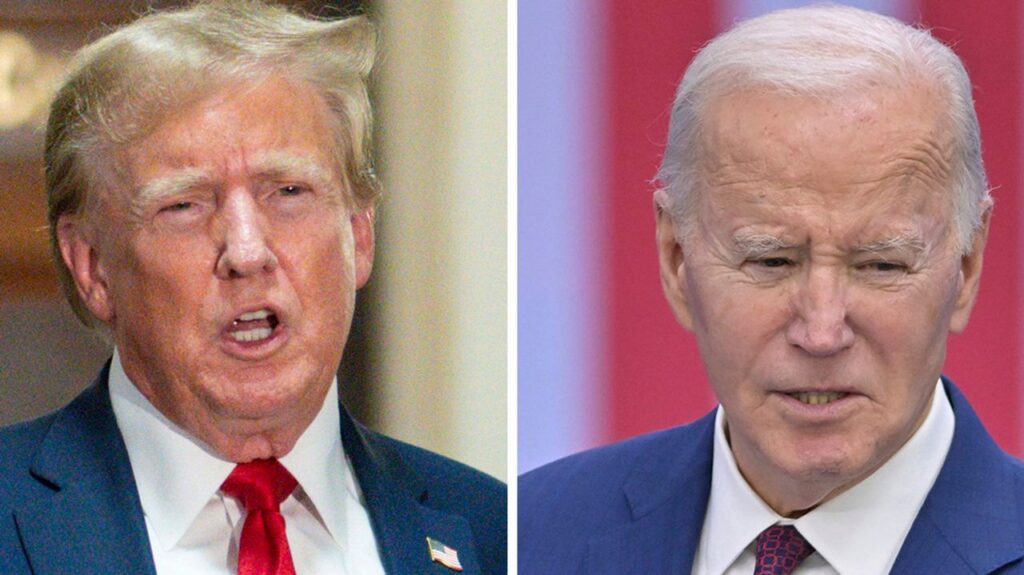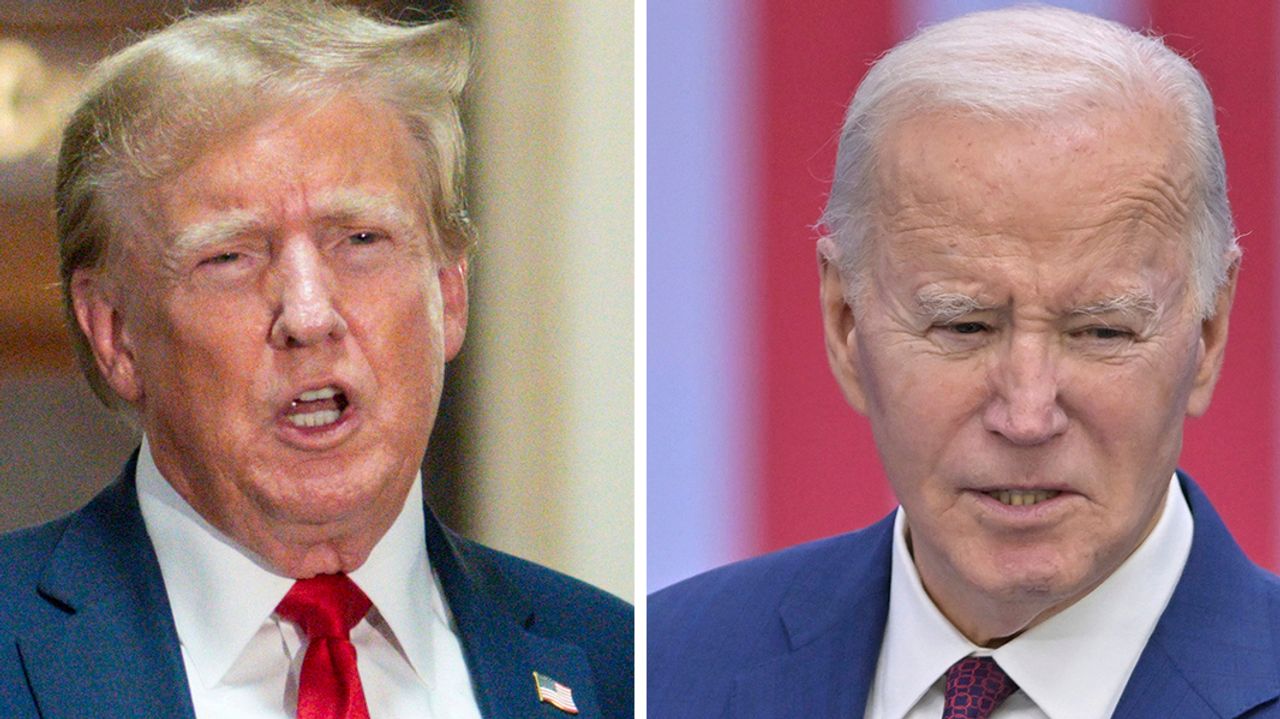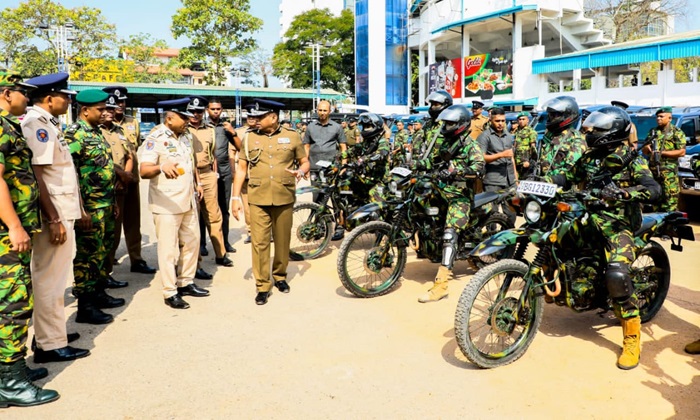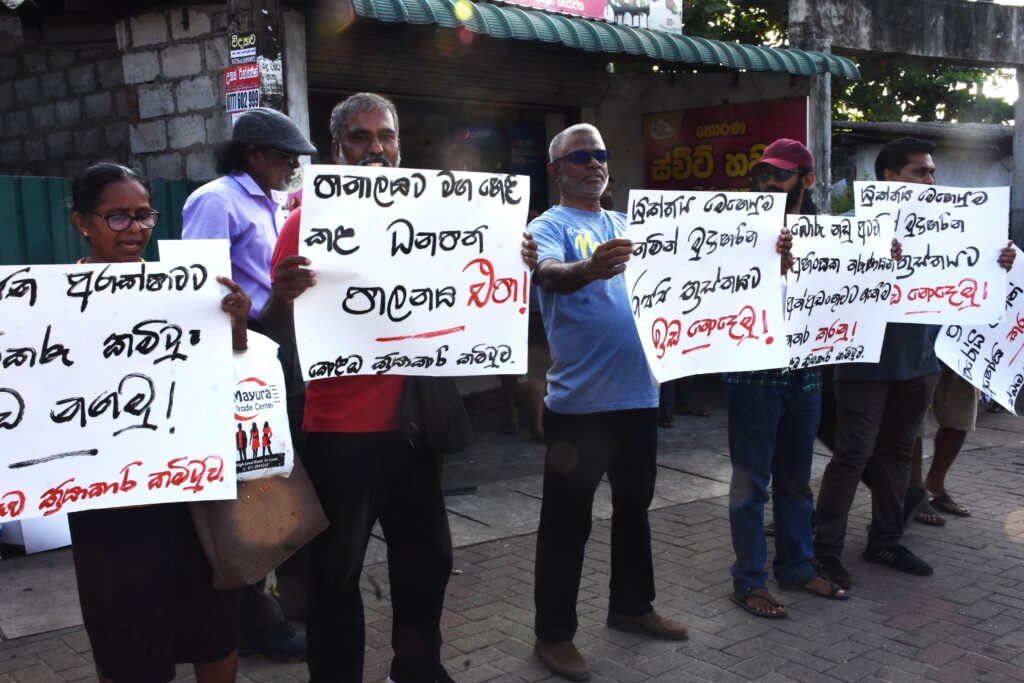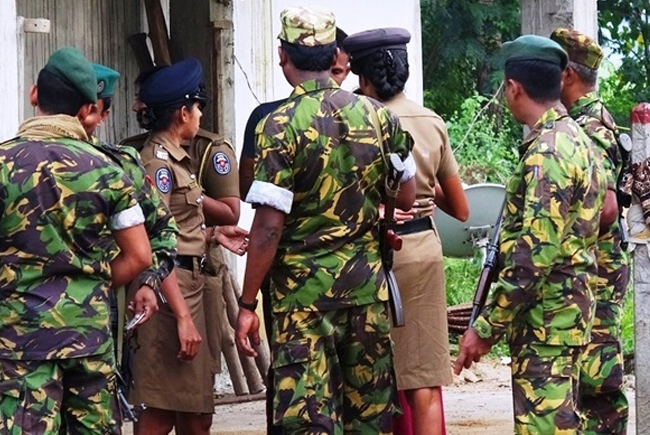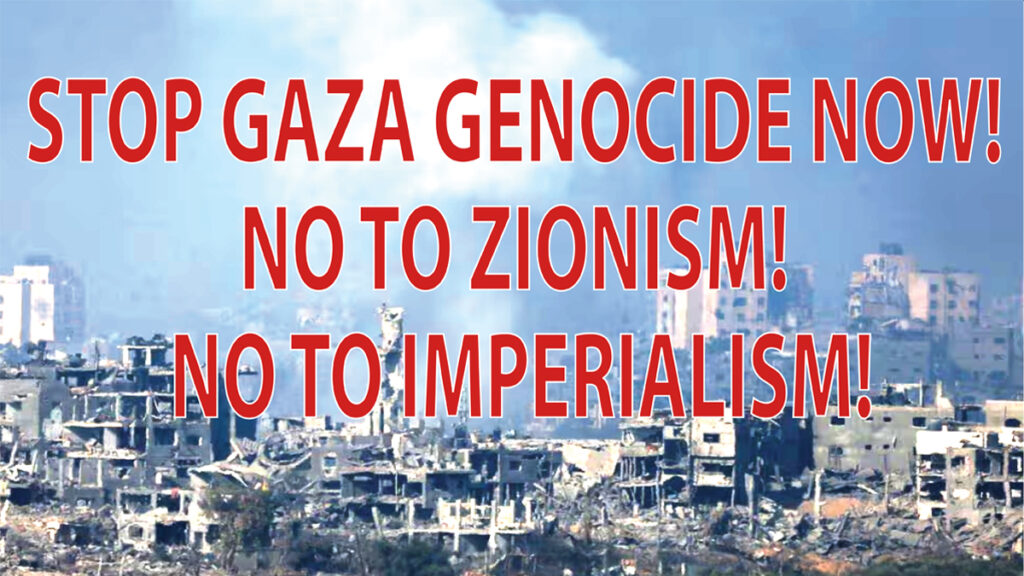By Sanjaya Jayasekera.
For Zionist imperialists, the history began on October 07, 2023, and the brutal oppression of Palestinians for 75 years is simply obliterated. Drawing an analogy, for Comrade Nandana Nanneththi, according to his diatribe of October 08, 2024, the history of our principled struggle against their nationalist clique had begun only from our final contribution of July 4, 2024. Nandana shamelessly suppresses the fact that the discussion in question formally started at least six months ago, on December 25, 2023, when Sanjaya proposed a programme of action to the Aggregate group, titled “The way forward for the SEP Left”. Our struggle consisted of a number of written explanations that followed, a 25-page document written by Comrade Migara before December 25 about the long degeneration of the party, and two submissions of nearly 30 pages written by Comrade Migara clarifying the discussion that broke out after my proposal of December 25. Only one document was submitted by the Nandana’s clique, by comrade Udayaprema, during this whole discussion. This document submitted in mid April largely contained straw-man arguments that distorted the facts. Nandana avoided the main problems that we raised, but his positions were made clear to us.
Nandana’s behavior shows that he perceives our refusal to respond to his frenzied statements in his own language and style as representing our weakness. He is wrong. Since we are not in the habit of biting like hounds infected with the disease of poisonous subjectivity, and being revolutionaries who have not abandoned the claim to the heritage of the historical continuity of the international socialist movement, we act to grapple with political issues theoretically, attempting the most for the political clarifications and lessons for the working class. That is our approach.
Nandana’s essay/article reeks of the symptoms of the subjective sickness of a petty-bourgeois charlatan, requiring it to be dissected into sentences and phrases and sometimes into words to discuss it in detail. Therefore, we have adopted a method of commenting within the original text of the essay itself and the commentaries are placed just after the relevant section of the texts which are placed within parentheses. This method, we hope, keeps the reader less distracted.
The Text and the Commentaries
[ජුලි 6 දා, නීතිඥයෙකු වන සංජය විල්සන්] I was called Sanjaya Jayasekera by party comrades. Nandana is using my middle name and profession as an appeal to backwardness. There was no relationship between my profession and my being a member of the revolutionary party, and the reader would understand what Nandana is up to. [මිගාර මල්වත්ත සහ සුනිල් මොරායස්] This is yet again a treacherous betrayal of exposing a comrade’s name against his written opposition. [යන ත්රිත්වය සසප වාම කන්ඩායමේ වෙබ් අඩවිය හා සියලු සංනිවේදන මාධ්ය පැහැර ගෙන පලා ගියහ.] This is an outright lie. We, the internationalist faction, expelled Nandana-led nationalist clique, and thus they have no politically legitimate entitlement to any of the media organs of the group, which was intended to function as a faction of the Socialist Equality Party of Sri Lanka (SEP). The faction was to be founded in opposition to the party leadership’s reactionary political tendencies that we struggled to identify, discuss, clarify and clearly define. theSocialist.LK website was not even in the dreams of any of the comrades of the group including Nandana, when Sanjaya foresaw the necessity of such a publication organ for the factional struggle and thus registered “theSocialist.LK”domain name under his name and started building a blog. All these were communicated to Nandana later and he agreed with the same. The blog was launched by Sanjaya on his birthday as a gift to all comrades of the group. Sanjaya was Editor of the website, not because he was appointed by any vote, but because he assigned it to himself and everybody accepted the status quo. The group decisions were reached never as an outcome of a so-called majority decision, and the decisions were taken usually by Sanjaya and Nandana during their discussions, and these decisions were approved tacitly by everybody. When Sanjaya suggested developing the blog into a website, he conceded that the other comrades too should contribute financially, so that everybody gets the sense of its significance as the axis of the faction, even though he could have borne the whole cost by himself, if that was necessary, which fact everyone of the group was well aware of. Some funds were taken from the Colombo Action Committee (CACPS) as a loan, as the contributions lying there were solely from the comrades in the group. Comrades Nihal and Punyawardena, the close associates of Nandana, controlled this bank account. Later, Sanjaya opened a Bank account with Parakrama, another long-time friend of Nandana, separately for theSocialist.LK, and Parakrama and Nandana were in control of the Bank ATM card, and they always put off handing it over to Sanjaya, never carrying it out. They used the website’s bank card to withdraw all funds, after the clique was expelled from the faction. Due to inadvertence, the return of the loan obtained from CACPS had not been effected by Parakrama or Sanjaya, as it was never raised or reminded within the group discussions, even by Nihal, who was CACPS treasurer and was long absconding meetings. Once the funds from the website account were illegitimately withdrawn by Nandana renegades, we demanded the overdue remittance of the loan amount to the action committee’s account, which Nandana has rejected in an email communication. CACPS is dysfunctional as of now, and its Secretary has yet to call a general meeting to elect the new office bearers, while Sanjaya’s Chairmanship has lapsed. [මාක්ස්වාදී මූලධර්මවලට ප්රතිපක්ෂව] Nandana merely utters this without any sort of substantiation, and the reader of this piece will understand what principles our struggle was and is based upon. [සසප වාම කන්ඩායම මෙහෙයවා ගැනීමට තමන් දැරූ උත්සාහය සහමුලින් ම අසාර්ථක වූ නිසා ඔවුහු මෙම තීන්දුවට එලඹුනහ.] The reader of this piece would understand the falsehood of these claims, and other allegations made against us. In fact, it was the N-clique (Nandana’s clique) that renegaded from internationalism, rejected reapplying for ICFI membership and fighting for SEP membership, rejected the Bolshevik method of factional struggle and relegated into an opportunist nationalist pressure group. [සසප වාම කන්ඩායම යනු 2014 සිට සසප වර්ධනයට බාධා වූ තත්වයන්ට එරෙහිව පක්ෂය තුල සටන් වැදී සිටි හා 2022 දී පක්ෂ නායකත්වය විසින් බොල්ෂෙවික් පිලිවෙත නො තකා නෙරපා හරිනු ලැබූ කන්ඩායම යි.] This group was not a ‘faction’, but admittedly a group of individuals later expelled from the Party, who were never organized on the basis of any political agreement. They did not stand, nor stand against any reactionary tendencies in the party leadership. Theirs was, in fact, an agitation group, and their so-called struggle was not against any reactionary tendency of the leadership, but against this or that ‘unprincipled activities’, and was wholly ad hoc, informal and irregular. After 2015 Second National Congress, Nandana, who could secure a place in the Central Committee, and his clique limited their agitation and entered into a tacit compromise with the leadership, only to be compelled to take arms against the party leadership during the mass struggles of 2022. By mid 2023, Nandana enrolled to the group two ex-members of the party, his close friends, who had deserted the party long time ago, and never wished to rejoin the party, but claimed their will to be engaged in the ICFI’s revolutionary politics, without being affiliated to it! [2021 අවසානය කාර්තුව දක්වා ම අප කන්ඩායමට විරුද්ධව සිටි විල්සන්ට පන්ති අරගලයේ වර්ධනය සමග පක්ෂ නායකත්වයෙන් තමන්ට එල්ල වූ පීඩනය නිසා අප අරගලය පිලි ගැනීමට සිදු විය] This is false. I had not expressed to them any opposition to or agreement with their specific political issues, nor I was a member of their group. Their issues were largely unknown to the membership, as that was the way the SEP leadership worked to prevent membership discussions on the political disagreements of members. The SEP leaders preferred faithful yes-men. The first time I expressed my political agreement with a political position taken by Nandana was when a dispute on the ICFI’s stance on the right to self-determination arose in late 2021, in which I was able to clear the confusions long nurtured by the party leadership. In 2015 only I was selected to the PC, and I was largely unaware of Nandana’s specific issues, because they never functioned as a political faction, but just as agitators within a couple of Locals. They never took part in a factional struggle. This was recognized also by comrade David North in his comments made at the start of Party’s Congress in 2015.
[විල්සන් කන්ඩායමේ පලා යාම සිදු වූයේ වාම කන්ඩායම සමග වූ මත භේදවලට මුහුන දීමට තමන් අසමත් බව වටහා ගැනීම නිසා ය] Outright falsehood. It was they who failed to respond to our documents and questions. Only we raised the political issues regarding the factional characterization, which then gave way to other issues of nationalism and internationalism as central questions within the SEP-Left. We fought for our explanations based on Bolshevik principles and they never attempted to answer our fundamental questions. These ultimately led to the expulsion of this unprincipled clique from the SEP-Left. [තමන් ජත්යන්තරවාදීන් ලෙස හදුන්වා ගත්] We, as genuine internationalists, stood for Bolshevik method of factional struggle and insisted on the struggle for ICFI membership, which they rejected. We also reasonably identified them as a nationalist opportunist clique. [ත්රිත්වය වෙනුවෙන්, සංජය විල්සන් ඇග්රිගේට් නමින් පවත්වා ගෙන ගිය අපගේ වට්ස් ඇප් පිටුවේ ජුලි 4දා මෙසේ සදහන් කර තිබිනි. “පිටු 65ක ලිපිය ඉහත එවා ඇත. මෙය කියවන්න ඉන් පසු කතා කරමු.“] The discussion, in which they merely kept opposing our views without merit and tried their best to derail it, had lasted close to seven months from December 2023, and the 04th July document was the final piece produced by us as sequel to two other main documents and other extended explanatory notes. In the final round of discussions Sanjaya had made oral submissions via Zoom, which followed ‘comments‘ from N-clique and then what was remaining was Sanjaya’s counter-submissions. As an aid to these final oral contribution, the written document was prepared in association with Comrade Migara, which was submitted. Therefore, in fact, the discussion had come to its dead end. In fact, our disagreements with Nandana’s positions did not arise just on December 25, 2023, but at the very inception of our engroupment, when 12 members were about to be expelled from the party. Sanjaya along with Migara and Sunil insisted that these comrades should declare a faction and take the fight against the bureaucratic party leadership, which Nandana-Udayaprema (the latter is the former’s brother-in-law) vehemently objected. They even adamantly refused to write to the party leadership against the intended expulsion, saying such a response is undesirable and, even after Sanjaya got almost all other comrades to agree for his proposal, this was not executed by the group due to Nandana’s vehement opposition. It was clear to us later that, in fact, Nandana wanted the expulsion to take effect, so that he can establish his petty-bourgeois pressure group that suits his way of social life. The expulsion removed from the ranks of the party/ICFI the revolutionary and progressive cadre, who were misguided by Nandana.
[ජුලි 6 දා ඔවුහු “සසප නායකත්වයේ ප්රතිගාමීත්වයට එරෙහි ෆැක්ෂන් අරගල ය ප්රතික්ෂේප කල, ජාතිකවාදී, එනම් ජාත්යන්තර කම්ටුවට හා සසපට බැදී ගැනීමට අරගලය නො කරන, සසප ගොඩ නැගීම සදහා අරගලය නො කරන (සසප ගොඩ නැගීම ලෙස ඔහු සදහන් කරන්නේ එහි ඔහු කියන ප්රතිගාමී නායකත්වයෙන් සසප ඩැහැ ගැනීම සදහා සිය අභිප්රාය බව මෙම ලිපියේ තහවුරු කරනු ඇත)….. සසප වම බහුතර කල්ලිය හා අප අතර කිසිදු සාකච්ඡාවක් ඉදිරියට පලදායී නො වන බව පැහැදිලි ය“ යි ලියූහ] Nandana desperately attempts to establish a falsehood that we were like going to execute a coup to usurp power from the party leadership! Our struggle is very clearly against the reactionary political tendencies of the party leadership, and not against the individuals in the leadership, which was made clear to the group. It was a factional struggle that we proposed, a fact which they are knowingly suppressing. The full extract of our letter is suppressed in order to raise a blatantly distorted meaning.
Following is the full text of the underquoted paragraph:
“අපගේ පෙර ලිපි හා බැඳි 2024 ජුලි 04 දිනැති අවසන් දිර්ඝ පැහැදිලි කිරීමේ දේශපාලන ලිපිය ඉදිරිපත් කරමින් සසප–වම බහුතර කල්ලියේ දේශපාලන අනන්යතාවය කවරක් ද යන්න අපි නිවැරදිව සනාථ කර ඉදිරිපත් කර ඇත්තෙමු. එම කල්ලිය සසප නායකත්වයේ ප්රතිගාමී ප්රවනතාවයන්ට එරෙහිව ෆැක්ෂන් අරගලය ප්රතික්ෂේප කල, ජාතිකවාදී, එනම් ජා.කට හා සසපට බැදී ගැනීමට අරගල නොකරන, සසප ගොඩනැගීම සඳහා අරගල නොකරන, ඒ අනුව මෙි රටේත්, මේ කලාපයේත් කම්කරු පන්තියේ නායකත්වයේ අර්බුදය විසඳීමට අරගල නොකරන, සසප නායකත්වය වමට තල්ලු කිරීමට පිඩනය යෙදීමේ බාහිර සුලු ධනේශ්වර දේශපාලන ප්රවනතාවයක් බව අප පෙන්වා දී ඇත. ඊට විරුද්ධව, සසප–වම සුලුතරය යැයි හදුන්වන අප, ජාත්යන්තරවාදය අනුයමින් සසප–වම ෆැක්ෂන් අරගලය බෝල්ෂවික් විධික්රමය අනුව ඉදිරියට ගන්නා විප්ලවවාදී කන්ඩායම වෙමු. හජජාක ඓතිහාසික උරුමය ආරක්ෂා කල හැක්කේම එයට බැඳී ගැනීමෙන් හා එසේ බැඳී ගැනීම සදහා අරගල කිරීමෙන්ම පමනි. අපගේ පෙන්වාදීමට පටහැනිව කරුනු ඉදිරිපත් කිරීමට අසමත් වෙමින්, පසුගිය මාස හයකට වැඩි කාලයක් තුල සිදුවූ සංවාදය තුල ඔබ හජජාකට හා සසපට බැදීගැනීමට කල යුතු ෆැක්ෂන් අරගලය පෙරට ගැනීමට නුසූදානම් බව පෙන්වමින් ඔබගේ ජාතිකවාදී ප්රවනතාවය තහවරු කර ඇත. මේ හේතුවෙන්, අප කන්ඩායම් දෙක අතර ප්රවනතාමය වෙනස හොදින් පැහැදිලිය. ජාත්යන්තරවාදය හා ජාතිකවාදය අතර එම ප්රවනතාත්මක ප්රතිගථිතතාවය සාකච්චාව තුලින් සමනය කල නොහැක්කකි. එය විසදෙන්නේ පන්ති අරගලයේ කොටසක් ලෙස එක් ප්රවනතාවයක් දේශපාලනිකිව පරාජය කිරීමෙනි. කම්කරු පන්තික ජාත්යන්තරවාදයේ ජයග්රහනය සඳහා ජාතිකවාදය හදුනාගෙන බැහැර කල යුතුය. අප ඔබ කල්ලයේ ජාතිකවාදය නිශ්චිතව හදුනාගෙන පෙන්වා ඇත්තෙමු. ඒ නිසා සසප–වම බහුතර කල්ලිය හා අප අතර කිසිදු සාකච්චාවක් ඉදිරියට ඵලදායී නොවනු ඇති බව පැහැදිලිය. අප ජාත්යන්තරවාදී කන්ඩායමට පමනක් ෆැක්ෂන අරගලය ඉදිරියට ගෙනයාමේ ඓතිහාසික උරුමය සුජාත ලෙස පැවරේ. අප එම අරගලය පෙරට ගනු ඇත. ට්රොට්ස්කිවාදී ජාත්යන්තරවාදය, බොල්ෂවිකවාදය පදනමින්ම ප්රතික්ෂේප කර ඇති ඔබ කල්ලියට හජජාක නමින් පෙනීසිටීමට කිසිදු සුජාතබවක් නැති අතර, ඒ අනුව සසප–වම නම් ෆැක්ෂනය නමින් පෙනී සිටීමේ, හදුනා ගැනීමේ හිමිකමක් ඔබට නැත.”
[අපගේ සාකච්ඡා සදහා වූ මාධ්ය තම නමින් තිබීමේ වාසිය භාවිත කරමින් ඔවුහු මෙසේ නිවේදනය කර තිබිනි. “වෙබ් අඩවියේ සුජාත හිමකම ඇත්තේ අප ජාත්යන්තරවාදී කන්ඩායමටයි…ඇග්රිගේට් හා කතිකා වට්ස් ඇප් සංවාද ගෘෘප තුල රැදී සිටීමට ඔබට කිසිදු ඓතිහාසික හිමිකමක් නැත. ඒ අනුව එම ගෘෘපවලින් ඔබ කල්ලිය වහා ඉවත් කරනු ඇත.“]
What we quoted above is the first paragraph of the July 06th letter. The rest of the letter is as follows:
“ට්රොට්ස්කිවාදී ජාත්යන්කරවාදයෙන් පලාගිය ජාතිකවාදී කල්ලියක් ලෙස හදුනාගත් ඔබට අප එවන ලද කිසිම ලේඛනයකින් ඔබට ජාත්යන්තරවාදය තුල කිසිදු වලංගුභාවයක් අත්කර දෙන්නේ නැත. එම ලිපි හා සටහන් ඔබට එවන ලද්දේ අප සැබෑ ජාත්යන්තරවාදීන් ලෙස ඔබ කල්ලියට පැවති වගවීමේ භාරයක් නිසා නොව, සහෝදරවරුන් අතර දේශපාලන පැහැදිලි කම සඳහා උදවි වීම පිනිසය. අප වගකියන්නේ කම්කරු පන්තියට ය. ඔබ කල්ලියට සසප ෆැක්ෂනක් ලෙස හදුනාගැනීමට කිසිදු ඓතිහාසික හිමිකමක් නැති බැවින්, ඔබගේ තීන්දු මගින් ජාත්යන්තරවාදී කන්ඩායම බඳිනු ලැබිය නොහැකිය.
thesocialist.lk වෙබ් අඩවිය ආරම්භ කලේ සසප–වම නම් ෆැක්ෂනයේ ප්රකාශන මාධ්යය ලෙස ය. එය කොල්ල කෑම සඳහා ජාතිකවාදී කල්ලියකට අවස්ථාව නොලැබෙනු ඇත. ෆැක්ෂන අරගලයේ කොටසක් ලෙස, එනම් ජාත්යන්තරවාදයේ කොටසක් ලෙස ආරම්භ කල බැවින් වෙබ් අඩවියේ සුජාත හිමිකම ඇත්තේ ද අප ජාත්යන්තරවාදී කන්ඩායමටය.
මේ කාරනා මත, සසප–වම ෆැක්ෂනයේ වේදිකා ලෙස ආරම්භ කල “ඇග්රගේට්” හා “කතිකා” වට්ස්ඇප් සංවාද ගෲප තුල රැඳී සිටීමට ඔබට කිසිදු ඓතිහාසික හිමිකමක් නැත. ඒ අනුව එම ගෲප වලින් ඔබ කල්ලිය වහා ඉවත් කරනු ඇත. එහෙත්, එහි ඉතිහාස ඔබට බා ගත හැක.
මේ රටේත්, මේ කලාපයේත් කම්කරු පීඩිත මහජනතාවගේ අරගලවලට නායකත්වය සම්පාදනය කල හැකි විප්ලවවාදී, සමාජවාදී ජාත්යන්තරවාදී නායකත්වයක් ගොඩනැගීමට, සසප ෆැක්ෂනයක් ලෙස අපි බොල්ෂවික ක්රමවේදය හා මූලධර්ම මත සටන් වදිනු ඇත. එය අසීරු ආරම්භයක් බව අපි දනිමු. එහෙත්, ඉතිහාසය එම වගකීම වෛශිකවම අප මත පවරා ඇති බව වටහා ගන්නා අපි එම අරගලය අප්රතිහත ධෛර්යයකින් යුතුව පෙරට ගන්නෙමු.
මීට,
සහෝදරත්වයෙන්,
මිගාර මල්වත්ත,
සුනිල් ප්රනාන්දු,
සංජය ජයසේකර.
2024 ජුලි 06”.
[විල්සන්ගේ පලා යාම පුදුමයට කරුනක් නො වේ. සසප පන්ති ව්යාපාරය තුල පරීක්ෂනයට ලක් වීමට පෙර ම මොහු මධ්යම කාරක සභාවට හා දේශපාලන කමිටුවට පත් කර ගත්තේ ය. 2019 ගොඩ නැගූ කලාව හා ප්රකාශනයේ නිදහස ආරක්ෂා කිරීමේ ක්රියාකාරී කමිටුවේ සභාපති ධූරය ද ඔහුට පැවරී ය. නායකත්වය සමග ගැටලු මතු වූ වහා ම විල්සන් දේශපාලන කමිටුව හා ක්රියාකාරී කමිටුව හැර පලා ගියේ ය. මෙබඳු ධෛර්ය හීන නිවට පුද්ගලයෙකු කම්කරු පන්ති සදාචාරයට බැඳෙන්නේ නැත.] The circumstances that led to my resignation, as the last option, have to be discussed separately at length. Nandana knows well about these circumstances and even subsequently approved my actions and admitted the leadership’s unprincipled pressure exerted upon me as an unbearable reality. My resignation from the ACDAE (Action Committee) and PC (I did not resign from the CC) were based on serious political issues. I was fighting against a number of retrogressive characteristics that I saw had developed overtime within the membership and in the day-to- day operation of the Party.
[අප විසින් සාමූහිකව වර්ධනය කෙරුනු-thesocialit.lk -වෙබ් අඩවිය සඳහා රුපියල් 14,500ක් කොලඹ ක්රියාකාරී කමිටුවෙන් ලබාගෙන තිබූ අතර එම මුදල කොක්රිකට ගෙවීම අප විසින් කල යුතු ය යි කල්ලියේ ප්රධාන කොල්ලකරුවා වන සංජය විල්සන් දන්වා එවා තිබිනි.] These are only provocative falsehood and slanders, part of his unsuccessful smear campaign against us, characterizing their middle-class politics. Attending to the settlement of accounts have been neglected by CACPS Treasurer, Nihal, and inadvertently not acted upon by Parakrama, who handled theSocialist.lk funds, as explained above. Nandana is well aware how efficiently Nihal operated. [දැනටමත් වටහා ගත හැකි පරිදි ඒ වන විට විල්සන් සමග අපගේ හවුල් ගිනුමක තිබුනු රුපියල් 30,000ක මුදල බේරා ගැනීම සඳහා වහාම ඉවත් කර නො ගත්තේ නම් එය ද කොල්ල කනු නො අනුමාන ය.] As explained above, N-clique looted money from theSocialist.LK joint bank account, which they did not have any political right of retaining. [කෙසේ වෙතත් අපි මේ ගැන විල්සන්ට දැනුම් දුනිමු. වෙබ් අඩවිය තම භාවිතයට ගත් විල්සන් එම මුදලින් ඒ සඳහා ගත් නය බේරන ලෙස අපට ලියා එවා තිබිනි.]
[මෙසේ පොදු දේපල කොල්ල කෑම,] Which public property he means? Turn to the experience of the history of splits in our movement to see how party property – especially the press and the theoretical organ – was succeeded by those claiming political legitimacy for the historical continuity of the movement. On the other hand, the renegades of the movement and those who have been legitimately expelled from the movement have no political right to claim any property rights. [සාකච්ඡා ප්රතික්ෂේප කිරීම,] They rejected discussions and we only called for discussions. When discussions were finally carried out, issues were cleared and political lines were distinctly drawn and obviously recognized. Finally, at the dead end, obviously, unending discussions were undeserved and redundant. [බහුතර මතය ගරු නො කිරීම] As explained above there was no majority decision-making as such; Nandana had got a close clique with him in support of his every idea. The group decisions were largely made during discussions between Sanjaya and Nandana and others agreed. The group had no office bearers. Nandana was selected at the very inception to chair the meetings on my proposal, due to his long experience in the Party leadership. [යනු කම්කරු විරෝධී සුලු ධනේශ්වර නිලධාරිවාදයේ ප්රකාශනයෝ වෙති. කෙසේ වෙතත් තමන් ජාත්යන්තරවාදීන් යයි ඔවුන් කියාගන්නා දෙය ගැන අප කිව යුතු වන්නේ, අප කිසියම් පුද්ගලයෙකු වටහා ගන්නේ ඔහු තමන් ගැන පවසන දෙයින් නො ව ඔහුගේ ක්රියාවන්ගෙන් සහ ඔහු ප්රචාරය කරන දෙයින් ය යි කාල් මාක්ස් පවසා ඇති බව ] Marx is correct, and we established why they are a nationalist clique, and why we are internationalist, based on asserted political standpoints. We are not just a web group; we, the Socialist Lead of Sri Lanka and South Asia (SLLA), the Revolutionary Left Faction (RLF) of SEP, inherit the legitimate claim for the historical continuity of Bolshevism and fight for resolving the crisis of proletarian leadership, which task they have expressly rejected. We abandoned using the term “SEP-Left” as they had illegitimately used it even after their expulsion from it in a diatribe published against us on 12 July 2024, which is full of distorted quotations and false allegations.
[විල්සන් කල්ලියේ කැරැල්ල]
The revolt referred to here is our expulsion of the Nandana-led reactionary clique from the SEP-Left. Nandana covertly finds another reason for our “revolt”. The truth is otherwise. The most recent circumstances for the expulsion of these renegades arose when our final submissions were made and we did not let theSocialist.LK to succumb to their nationalist lines. The clique then assembled and decided to take control of the website and impose their nationalist politics forcefully upon us, based on a never-existed or accepted “majority decision” of their never-formed “committee”. Their ostensible hatred against us is fuelled by this political wisdom of ours that prevented them from executing an organizational coup against the internationalist tendency, subjugating it under their clique’s control.
[මෙම ඊනියා ජාත්යන්තරවාදීන් සහ සසප වම අතර දේශපාලනික පිපිරීමට තුඩු දුන් ආසන්නතම සිද්ධිය වූයේ, “පොලීසිය, තමන් නින්දාවට පත් කරන කරුනු පත්රිකාවක අඩංගු කල නො හැකි බව කියමින් කොලඹ ක්රියාකාරී කමිටුවට (කොක්රික) කඩා පනී“ යන හිසින් ලෝක සමාජවාදී වෙබ් අඩවියේ සිංහල අංශය 2024 පෙබරවාරී 29 දා පල කල ලිපිය සම්බන්ධයෙන් අපගේ ප්රතිචාරය පිලිබඳ පැන නැඟුනු මතභේදය යි]
This is an outright lie. The differences arose only at least from the date of December 25, 2023, when Sanjaya made a programme proposal to the group in a document titled “The Way Forward for SEP-Left”, which Nandana shamelessly suppresses. This significant document suggested as follows:
“Comrades should note that our expulsion by the Political Committee of the SEP is subject to the approval of the Congress [Party Constitution Clause 10(f)]. Congress is the final appeal body, only which we can place our trust upon, and we should appeal to the Congress for the revocation of our expulsion. Trotsky did the same, when he was expelled by the leadership of the Russian Communist Party. As Cannon says, Trotsky did not just get up and walk away from the Party. In 1928, when the Sixth World Congress of the Comintern was held in Moscow, Trotsky, at the first opportunity he got, appealed to the Congress against his expulsion. He at the same time submitted a criticism of the Draft Program prepared by Bukharin and Stalin. This commentary only paved the way for the establishment of a section of the Trotskyist Left Opposition in the United States, under the leadership of Cannon.
We too can and must use this opportunity and be ready to appeal to the next Congress of the Party. But, in the meantime there is a tremendous bulk of work to be done. We work continuously as the SEP-left faction – which we continue to claim ourselves to be – with our full might with the goal of building a new leadership in the party, and this requires fighting for political clarity on the degeneration of the Party leadership and the party as a whole. These documents will enlighten the party membership mainly, and also the working class at large. We will continue to publish our documents on our publication organ, theSocialist.LK.”
Even long prior to this proposal of the programme of action, comrades Sunil, Migara and Sanjaya were pointing out the necessity of defining the group as a faction of the party, so that our struggle is well programmed and we would be able to recruit new comrades to the faction. This document and our explanations to the group proposed a factional struggle to fight against to-be-defined reactionary tendencies of the party leadership and to appeal for our membership (along with a Congress perspective resolution), all of which Nandana rejected. In January and early February 2024, the group had two days of discussion on this proposal, and further discussions in this regard were effectively rejected, falsely claiming that issues have been resolved and Nandana was going to draft and finalize a long-awaited and assigned document explaining the Party’s degeneration, which he never did. Thereafter, the ensuing discussion was centered on Nandana’s proposal, made on March 16, to form SEP-Left as a group that pressures the party leadership against its shifting toward the political right. He proposed a new formulation of programme, consisting of alternative options: the SEP-Left shall struggle to put the party on the right track, and join with them in the revolution when they lead and do it, and if they fail and derail itself from ICFI programme, then the SEP-Left will step in and lead the masses! We rejected this opportunist and pragmatic formulation that abandoned the task of the revolutionary Party of resolving the crisis of the proletarian leadership. We stood for the factional struggle to build the SEP as the revolutionary leadership of the working class of Sri Lanka and the region. [ආන්ඩුවේ මර්දන හස්තයක් වන “යුක්තියේ මෙහෙයුමට“ එරෙහිව කොක්රික දියත් කල අරගලයට පොලිසියේ තාඩන පීඩනවලට මුහුන දීමට සිදු වුනි. සසප ලිපිය පැහැදිලිව ම එම පොලිස් මර්ධනයට එරෙහිව කම්කරු පන්තියට අනතුරු හැඟවූයේ ය.]
[ඒ අතර සසප, කොක්රික කෙරෙහි මහජන අප්රසාදය කැඳවන ප්රකෝපකාරී ප්රකාශයක් ද තම ලිපියේ අඩංගු කලේ ය. “සමාජවාදී සමානතා පක්ෂය (සසප) මෙම කොලඹ ක්රියාකාරී කමිටුව සමග ගැඹුරු දේශපාලන වෙනස් කම් තිබිය දී ඔවුන්ට එල්ල කර ඇති මෙම රුදුරු ප්රහාරයට විරුද්ධත්වය පල කරයි. කොලඹ ක්රියාකාරී කමිටුව පිහිටුවාගෙන ඇත්තේ විනය චෝදනා මත සසපයෙන් නෙරපා හරින ලද කන්ඩායමකි,“ යනුවෙන් එහි සඳහන් විය. මෙම ප්රකාශය කම්කරු පීඩිත ජනයා කිහිප අතකින් ම නො මග යවනසුලු වන අතර සසප නායකත්වය කවර කලෙකවත් පවතිනවාය කියන මෙම දේශපාලන ප්රශ්න පැහැදිලි කිරීමට මැදිහත් වී ද නැත. එසේ මැදිහත් වීමේ හැකියාවක් ද ඊට නැත. සත්තකින්ම එය ලැබුනු සෑම අවස්ථාවකම කොලඹ ක්රියාකාරී කමිටුව අප්රසාදයට ලක් කර විනාශ කිරීමේ අරමුනින් වැඩ කර ඇත. නමුත් සසප වම බහුතරය මෙම විකෘතියට විරුද්ධව එය නිවැරදි කිරීමට උත්සාහ කලා මිස සසප නායකත්වය අනුගමනය කල පිලිවෙතින් ම ප්රතික්රියා නො කලේ ය.]
[රටේ සියලු පක්ෂ හා සංවිධානවල විවෘත හෝ නිහඬ සහාය (සසප මේ පෙරමුනට එක් නො කල යුතු ය) ලැබ ක්රියාත්මක වූ රාජ්ය මර්දන ව්යාපාරයට විරුද්ධව මූලිකත්වය ගෙන ක්රියාත්මකව මැදිහත් වූ එකම සංවිධානය කොක්රිය යි. ත්රිත්වය මෙයින් ලද ප්රසාදය මත දෙපා පිහිටුවා ගෙන මුලු වැර යොදා සසපට පහර දීමට යෝජනා කලහ. මාර්තු 2දා සංජය විල්සන් මෙසේ යෝජනා කලේ ය. “සැබෑව නම් සසප නායකත්වයේ කට්ටිවාදය (sectarianism), නිලධාරීවාදය (Bureaucratism) හා අපෝහක විරෝධී සංස්ථිතිකවාදය (conservatism) යන දේශපාලන ප්රවනතාවයන් හෙලි දරව් කිරීමට කටයුතු කරමින් ලංකාවේත් මෙම කලාපයේත් විප්ලවවාදී පක්ෂය ආරක්ෂා කිරීමට අඛන්ඩව කටයුතු කරමින් සිටින්නේ සසප වාම කන්ඩායම යි.“] The faction and the factional fight obtain political legitimacy when our factional fight is based on defined political lines as against another faction and, therefore, defining SEP-Left in opposition to reactionary tendencies of the party leadership is a political necessity. Our characterization of the party leadership was thus to serve this purpose. The characterization we arrived at was drawn from the common understanding, historical experience and knowledge of the members of the group and upon the general perspective of the membership of the party. We, party comrades, knew how these tendencies manifested in the party leadership, and we were required to place that understanding in a historical, internationalist and class analysis, which is an enormous task they refused, even as a group work, and we undertook. N-clique never expressly rejected this characterization – though we could construe their refusal of the same – nor suggested their own characterization of the reactionary tendencies of the leadership, because they recognized no such tendencies within the party leadership.
[හාස්යජනක කරුන නම්, යුක්තියේ මෙහෙයුමට එරෙහිව අප ගෙන ගිය අරගලයට මුල සිට ම විරුද්ධව සිටි මිගාර මල්වත්ත සහ සුනිල් මොරායස් යන ත්රිත්වයේ සාමාජිකයින් දෙදෙනා] They never opposed, but raised valid concerns. [වහාම සංජය විල්සන්ගේ සහායට පැමිනීම ය. ඔවුනට වැදගත් වූයේ රාජ්ය මර්ධනයට එරෙහි ව මහජනයා බලමුලු ගැන්වීම පසෙක තබා ශ්රී ලංකාවේ එකම කම්කරු පන්තික විප්ලවවාදී පක්ෂය වන සසපයේ නායකත්වයට මුලධර්ම විරහිත ප්රහාරයක් එල්ල කිරීම බව සනාථ කිරීමට ඉහත උපුටනය වුව ප්රමානවත් ය.] This conclusion shows Nandana’s ahistorical approach to the significance of the correctness of the leadership of the revolutionary party in the class struggle. Readers would note that this allegation that we wanted to mount an ‘unprincipled attack on SEP’ is totally unfounded and dishonest, given that the very quotation Nandana cites proves the advanced and theoretical struggle we were supposed to take. [රාජ්ය මර්ධනයට ඉඩ දෙමින්] We gave way for state repression! This is again a malicious lie. [දකුනු ආසියාවේ එක ම කම්කරු පන්තික විප්ලවවාදී පක්ෂයට මූලධර්ම විරහිත ප්රහාරයක් ඉල්ලා සිටීමේ ක්රියාව] We demanded a factional struggle to build the party, which is Bolshevik method, and they rejected it. [වෛෂයිකව සැලකූ විට, ඒ කම්කරු පන්තියට ද්රෝහි වීමක් හැර එහි අන් අර්ථයක් තිබේ ද?.] A vile, Goebbelsian lie again.
[මාර්තු 13 සසප වම වෙනුවෙන් නන්දන නන්නෙත්ති ලියූ, “රාජ්ය මර්දනයට එරෙහි කොලඹ ක්රියාකාරී කමිටුව හා ශ්රී ලංකාවේ සමාජවාදී සමානතා පක්ෂයේ භාවිතය“ යන ලිපිය බහුතරයේ අනුමැතියෙන් thesocialist.lk හි පල කෙරින] This is a distortion of facts. Not just the N-clique, but all group members tacitly approved the article. It was edited and approved by website’s Editor, Sanjaya for publication.
[සංජය විල්සන්ගේ යෝජනාව ප්රතික්ෂේප කල එය] It could not reject the proposed characterization of the SEP leadership, nor elaborate on it, simply because the characterization was just tabled for discussion, and the article only did not go to the extent of discussing the disputed issue. [සසප ලිපිය කොක්රිකට එල්ල කල ප්රහාරයේ අර්ථය පැහැදිලි කිරීමෙන් ඉක්බිති මෙසේ අවසන් කලේ ය. “සසප මෙම තත්වය බැරෑරුම්ව සලකා බැලිය යුතු ය. වෛෂයික සත්යය යටපත් කිරීමට අවස්ථාව සැලසූ කොන්දේසි එකිනෙක බිඳ වැටෙමින් පවතී. වර්ධනය වන පන්ති අරගලය සත්යය ඉස්මත්තට ගෙන එනු ඇත.“]
[මෙම ලිපිය නිසා උරන වූ විල්සන් කල්ලිය,] A false claim. If there was such a dispute, the article would not have been published at all. [සිය මූලධර්ම විරහිත ප්රයත්නය ජාත්යන්තරවාදයේ නමින් ඉදිරිපත් කරමින් සිටින අතර ම, කන්ඩායමේ සතිපතා රැස්වීම් හා ක්රියාකාරි මැදිහත් වීම් කඩාකප්පල් කිරීමට වැඩ කලේ ය.] The issues to be resolved were now about the faction’s fundamental existential issues and, so, the regular discussions or activities of the group and of the Editorial meetings had lost their political validity and legitimacy, until those fundamental existential issues, the political characterization of the group, were resolved. [විල්සන් කොක්රික සභාපති ලෙස ඔහුට පැවරුනු වගකීම් නො තකා එය අක්රීය කිරීමට ද ක්රියා කලේ ය.] Nandana was trying to employ his clique and convert CACPS into an organization of his impressionistic and middle-class pressure politics, away from the working class struggles, which endeavours Sanjaya was careful to guard against. [තමන්ට ප්රශ්න ඇති නිසා ඒවා විසඳෙන තෙක් කිසිවක් කල නො හැකි යයි කී විල්සන් කල්ලිය විසින්, මාර්තු සිට ජුලි දක්වා මාස පහක කාලයක් ඒවා විසඳා ගැනීමට ලබා දුන් සියලු අවස්ථා මගහරින ලදී.] This is again falsehood and an outright lie. We waged a principled struggle in carefully preparing our documents, submitting explanations, and engaging in the discussion, which Nandana shamelessly suppresses.
[විප්ලවවාදී ව්යාපාරය වර්ධනය වන්නේ පරස්පර විරෝධය මග හැරීම තුල නො ව පරස්පර විරෝධයන් ජය ගැනීමට ගෙන යන අප්රතිහත අරගලය තුල ය. විල්සන් ත්රිත්වය අපෝහක භෞතිකවාදයේ මෙම මූලධර්මයට හතුරු වූහ.] Nandana habitually uses the phrases “dialectical materialism”, “dialectical method” or “dialectics” as rhetoric. [අපි වට්ස්ඇප් ගෘෘපය තුල ලිඛිතව ගෙන ගිය සාකච්ඡාවට අමතරව විශේෂ සාකච්ඡා දෙකක් මැයි 3 හා මැයි 12 දෙදින තුල ත්රිත්වය සමග සිදු කලෙමු] This was the final round of discussions referred to above. [ඔවුන් දිගින් දිගටම අවධාරනය කරමින් කියා සිටින, සසප නායකත්වයේ ඇතැයි කියන ප්රතිගාමීත්වය අවස්ථාවාදය යනාදිය වෛෂයික, ඓතිහාසික පදනමක පිහිටා විශ්ලේෂනය කර සනාථ කරන මෙන් අපි ඔවුන්ගෙන් ඉල්ලා සිටියෙමු.] This claim is bogus. This discussion never materialized fully. They even never expressly agreed or disagreed with our characterization of the SEP leadership’s reactionary tendencies, nor did they propose any other characterisation. Immediately after our arbitrary expulsion from the party, it was agreed between Sanjaya and Nandana, known to other comrades of the group, to write a document explaining the party’s long-time degeneration, which he neglected and never did. It was only we who from the very inception demanded a characterization of the SEP-Left, in relation to the party leadership, which thereupon only ignited all disputes, and Nandana delayed and even rejected clarifying this fundamental question of the nature of the ‘faction’ claiming such question was non- existent. Then the discussion was directed toward the fundamental form of our ‘faction’, as Nandana rejected the factional struggle, while refusing to appeal to the party Congress under its Constitution for our membership of the party and to fight for our party membership. He proposed our group should act as a pressure group to redirect/realign SEP leadership to the left from shifting further to the right. Nandana even tried to mislead the comrades of the group by falsifying the history of the Bolshevik movement and asserting that you don’t need to be a member of ICFI/SEP to be a Trotskyist internationalist! He further maintained that the SEP-Left does not need any ‘official’ affiliation to the ICFI to be identified as ‘internationalist’! This is a complete rejection of internationalism, the fundamental principle of Bolshevism. We rejected to accept this nationalist perspective. [එවිට ඔවුහු එම ප්රශ්නයට ප්රතිචාරය ලෙස ලිඛිත ප්රකාශයක් ලබා දීමට පොරොන්දු වූහ. ඉන් අනතුරුව සාකච්ඡාව ගෙන යා හැකි බව ඔවුහු යෝජනා කලහ.] This is false. We did undertake to produce, before my final submissions, a conclusive document, not dealing with our characterization of the reactionary tendencies of the party leadership, which was not the issue at that stage of discussions, but on the fundamental nature of our group’s struggle, refuting their nationalist formulations. Also, even during this period WhatsApp discussions were going on and we were making necessary contributions. [ඒ අනුව මාස දෙකකට පසු එකම දේ පුනරුච්චාරනය කරමින් ඉවබවක් නැති චෝදනා හා ඕපාදූපවලින් පිර වූ පිටු 65ක් අපට භාර දුන් ඔවුහු ඉන් දින දෙකකට පසු සාකච්ඡා කිරීමට දෙයක් නැතැයි පලා ගියහ] As explained above, this is a shameful suppression of important events in the development of the discussion. The last document titled, “The Way Forward for SEP-Left against the Nationalism of Nandana-Udayaprema Group”, preceded two other major documents dated 08.04.2024 and 03.05.2024, cumulatively comprising of another 30 odd pages titled “The way Forward for SEP-Left: Essential Political Questions”, written by comrade Migara, and several other essential notes made by comrade Sanjaya clarifying the political issues. (These documents and notes are accessible to those comrades who wish to study our struggle and join SLLA to fight to build SEP)
[වගකීම් විරහිත චෝදනා
ලිපියෙන් ඔවුහු මේවා ගෙන හැර දක්වති: “සිංහල බෞද්ධ ස්වෝත්තමවාදය සමග වාස්තවිකව පෙල ගැසීම,“ “2015 සම්මේලනය ව්යවස්ථා විරෝධී ලෙස කැඳවීම,“ “සාමාජිකත්වය දෙගුනයක් කිරීමට 2020 යෝජනාව කඩාකප්පල් කිරීම මගින් ඓතිහාසික මට්ටමේ දේශපාලන අපරාධයක් සිදු කිරීම,“ 2021 ගුරු අරගලය තුලදී “මහා වර්ජනයකට මුහුන දීමේ නුසූදානම පෙන්නුම් කරමින් කම්කරු පන්තිය තුල විශ්වාසය බිද ගැනීම,“ “විප්ලවවාදී ප්රවනතාවය සම්පූර්නයෙන් ම විප්ලවවාදී පක්ෂයෙන් මෙන් ම හජාජාකවෙන් ප්රජාතන්ත්ර විරෝධී ලෙස පලවා හරිමින් ඓතිහාසික අපරාධයක් සිදු කිරීම,“ “2022 විප්ලවවාදී නැගිටීමේ දී ඓතිහාසික පරීක්ෂනයෙන් අසමත් වීම.“
මෙහි සඳහන් අතිශයෝක්ති නො තකා, ඒවා ඒ හැටියට ම සත්යය යයි අප මොහොතකට පිලිගත්තත් මේවා එම චෝදනාවල යථා සම්බන්ධතා පැහැදිලි නො කරයි. ප්රශ්න හුදෙක් දමා ගැසීම හෝ ඒවා මග හැර සිටීමේ ප්රතිඵලය වන්නේ, ඒවාට හේතු වන ධනේශ්වර සමාජ පරස්පර විරෝධයන් හඳුනා ගැනීමට ඇති අවස්ථාවන් අහිමි කර දමා පවත්නා විඥානයට තවතවත් වර්ධනය වෙමින් පැවතීමට ඉඩ හසර විවර කිරීම ද, ඉන් නො නැවතී තමන්මත් ඒවායේ ගොදුරක් බවට පත් වීම ද බව ඉතිහාසයේ අත් දැකීමයි.] Our readers would note that these documents were written as internal documents to the former members of the party, who were well aware of these matters, and had a tacit agreement with. To explain these to a larger working class audience, we are required to write extensively, which Nandana delayed continuously and later abandoned, exposing his dishonesty in the undertakings he had given, failing to mobilize the group for the task, in spite of major contributions made by Migara in that regard. We, SLLA, are continuing this struggle.
[මොවුහු දිගින් දිගටම සසප නායකත්වය ප්රතිගාමී ය යන තමන්ගේ නීර්නය පිලිගන්නා ලෙස අපට බලපෑම් කලහ. ලිපියේ පිටුවක් පාස ප්රතිගාමී යන වචනයෙන් සසප නායකත්වය හදුන් වන අතර එහි 10 ((XXXI) ඡේදයෙන් “ප්රතිගාමී සසප නායකත්වය විස්ථාපනය කරමින් ව්ප්ලවවාදී පක්ෂය තුල නිවැරදි නායකත්වයක් පිහිටු වීමට උදයප්රේම -නන්දන කන්ඩායම සූදානම් නැත“ යි අපට චෝදනා කරයි. අපි එම චෝදනාව නො පැකිල පිලි ගනිමු.] Exactly! They admit it expressly now, showing they have nothing to do with a factional struggle. Nandana clique is not waging a struggle for the resolution of the crisis of the leadership of the working class of this country and the region. For them, the SEP leadership, for years, have only shown their hostility to principles from their this or that actions, and these expressions of hostility to principles do not represent any development of identifiable reactionary tendencies within the leadership. Therefore, what is necessary is to exert pressure from outside upon the leadership against their shifting to the political right. For this, they do not need membership of the party or the International Committee. There is no necessity of a factional struggle too, as the party leadership has not shown any reactionary tendencies in their practice. When we asked this specific question from them, whether they considered these ‘unprincipled’ practices to have developed into the status of reactionary tendencies, they just avoided the question. But, we were correct in the analysis of their positions, and we clearly identified that they have no grounds or intention to claim to engage in a factional struggle.
[විල්සන් තම ස්ථාවරය සම්බන්ධයෙන් කෙතරම් නිර්දය වූයේ ද යත් උදයප්රේම සහෝදරයා ලියා thesocialist.lk අපගේ වෙබ් අඩවියේ 2024 ජුනි 28 දින පලකල “වැටුප් දීමනා ලබා නො දීමේ ආන්ඩුවේ පියවර හා කම්කරු අරගල“ යන ලිපිය කන්ඩායමේ විරුද්ධත්වය නො තකා තමන්ට අවශය පරිදි වෙනස් කලේ “සසප නායකත්වයේ ප්රතිගාමීත්වයට“ යනුවෙන් පදයක් ඊට එක් කරමිනි. විල්සන් “කතෘ වෙබ් අඩවියේ දේශපාලන පිලිවෙත් අනුව ලිපියට එක් කරනු ලැබූ අවසන් ඡේදයට ලේඛකයා බලවත් නො එකඟතාවය පලකර ඇති බව කරුනාවෙන් සලකන්න.“ යි ලිපියට පහලින් සටහන් කලේ ය.] [වෙබ් අඩවියේ දේශපාලන පිලිවෙත් අප විසින් පත්කෙරුනු කතෘට තීන්දු කල නො හැකි බව කවුරුන් වුවත් පිලිගනු ඇත] As explained before, Sanjaya was not the appointed editor, but he was the editor. Readers are reminded of the leadership the “The Three Generals”, Cannon-Shachtman-Abern, had assumed in themselves “by a higher law” because they started the fight after they were expelled from the Communist Party of the US in October 1928 and declared a faction, before they were formally formed as a faction of the CP in May 1929. The edition as quoted above was the most correct political decision. We placed the article in its internationalist perspective and under the Bolshevik method of factional struggle. Correctly quoted, the article was edited to state as follows: “අන් සියල්ලටමත් මත්තෙන්, හජජාක ලංකා ශාඛාව වන සමාජවාදී සමානතා පක්ෂය ගොඩ නැගීමත්, ඒ තුල ඉදිරි මහජන අරගලවලට නායකත්වය සම්පාදනය කල හැකි අව්යාජ විප්ලවවාදී නායකත්වය ස්ථාපිත කිරීමත් කම්කරු පන්තියේ ජීවිතය හා මරනය පිලිබඳ ප්රශ්නයකි. සසප නායකත්වයේ ප්රතිගාමී ප්රවනතාවන්ට එරෙහිව නායකත්වයේ මෙම අර්බුදය විසඳීමේ අරගලය සසප–වම ෆැක්ෂනය පෙරට ගනිමින් සිටී”.
[හුදු වැරදි ගැන නන් දෙඩවීම හැර සසප නායකත්වයේ ප්රතිගාමීත්වය (reactionary) සමාජයේ ඉදිරි ගමන වැලැක්වීම හෝ ආපස්සට ගමන් කරවීමට උත්සාහ දැරීම යන එහි නියම අර්ථයෙන් පැහැදිලි කර සනාථ කිරීමට ඔවුන් කිසි දිනක උත්සාහ කර නැත.] This was the task of the faction, and we, the RLF only have undertaken this grand political and theoretical task. Admittedly, Nandana clique has abandoned such a factional struggle. [අනික් අතට ප්රතිගාමී නායකත්වයක් විසින් මෙහෙයවනු ලබන පක්ෂයක් ප්රගතිශීලී වීමට ද ඉඩක් නැත. මන්ද යත්, ඉතිහාසයේ පාඩම් අනුව පක්ෂ ගොඩ නගනු ලබන්නේ ද, ඒවා විනාශ කරනු ලබන්නේ ද නායකත්වයන් විසින් මිස සාමාජිකයන් විසින් නො වන නිසා ය.] [එවන් නායකත්වයක් ජාතිකවාදී ප්රතිගාමී ධනේශ්වරයේ ම උපකරන, වර්ගවාදී, ආගම්වාදී, ව්යාජ වාම වන් ප්රපංචයක් ලෙස මතු වී සිටිය යුතු ය.] These are unqualified, grossly simplified and vague historical generalizations in respect of the dialectics between the leadership, the party, the membership and the class. One may asses the interactions of these vectors in the examples of the following – the circumstances that led Lenin to formulate April Theses, the class formation of the party just after the Russian Civil War that laid the ground for the formation of Stalinist bureaucratism, and Trotsky’s struggle of the Left Opposition against Stalinism. Does Nandana have evidence of such manifestations in the reactionary leadership of the WRP? [තතු එසේ නම්, එය කම්කරු පන්ති ව්යාපාරයෙන් පලවා හැරීමට සටන් කිරීම යුක්ති යුක්ත ය.]
[නිලධාරිවාදය]
Nandana clique never bothered to arrive at any clarification as to our characterization in respect of the reactionary tendencies of the party leadership, nor of bureaucratism too. As explained above, they tacitly rejected any such development of reactionary tendencies in the party leadership, except for admitting the existence of this or that sort of conduct against principles. Were those clarifications attempted by them during the course of our discussions within the group these arguments would have been adequately dealt with by us at that stage of the discussion.
[එසේ ම අප වාම කන්ඩායම පක්ෂයෙන් නෙරපා හැරීම වැනි කරුනු කිහිපයක් සසප නායකත්වයේ නිලධාරිවාදයට (Bureaucratism) සාක්ෂි ලෙස ඔවුන් ගෙන හැර පා ඇත.] SEP Leadership’s toxic subjectivism and bureaucratism that we characterize as a matter of fact have developed due to its long-time isolation from the working class, thus being unprepared to lead the class struggles, which is an enormous challenge posed by the unprecedented upsurge of spontaneous class struggles. This was demonstrated vividly during the historic mass struggles of April-July 2022. This alienation led to sectarianism and conservatism, which aggravated bureaucratism in a vicious cycle. These, in the final analysis, are the consequences of subjugation to the nationalist pressures of the prevailing bourgeois consciousness of the working class, upon which the leadership has diluted its faith in the potential to educate an advanced section of the working class as Marxist revolutionaries, ultimately leading to skepticism in the revolutionary role of the working class of countries of belated capitalist development like Sri Lanka and those of South Asia. This goes against the very principles of the Permanent Revolution. Manifested in a multitude of ways, this developed in the leadership a nationalist opportunist tendency. SLLA documents being prepared will explain this analysis further. This development is an objective historical process, and Nandana is not only trivializing the depth and degree of this phenomenon but also fails to recognize this qualitative development. Therefore, it is patently clear why Nandana and the clan cannot move forward an inch beyond simple identification of this or that unprincipled conduct of the leadership. [සසප නායකත්වය තුල නිලධාරීවාදී ප්රවනතාවක් වැඩෙන බව ප්රදර්ශනය කල බොහෝ අවස්ථා ඇති බව අපි පිලිගනිමු. ඒවා පක්ෂය තුල කුෂ්ටයක් මෙන් වැඩෙන්නට ද උත්සාහ කරයි. පක්ෂයේ පරිහානියට දැනටමත් හේතු වී ඇති මේ තත්වයට පිලියම් නො කලහොත් පක්ෂය විනාශයට බඳුන් වීම නො වැලැක් විය හැකි ය. එහෙත් මේ තත්වය සියලුම විප්ලවවාදී මූල ධර්ම යටපත් කරමින් පරිපාකයට පත් වී ඇතැයි අපට කිව හැකි නො වේ. අපි බිත්තරයට කුකුලා යයි නො කියමු. නිලධාරීවාදය පරිපාකයට පත් වී ඇති පක්ෂයකට තව දුරටත් ජාත්යන්තර කමිටුවේ සාමාජිකත්වය දැරීමට ඉඩ ලැබෙනු ඇතැයි සිතීමට හැකි වීම නිලධාරිවාදය තරම් ම භයානක ය.] ICFI has a rich historical experience to learn from about how sections of the ICFI degenerated while still having membership of the IC. This was explained at length by Migara in his final document, and Nandana is tiptoeing to easily avoid dealing with this important explanation. We are also aware that the International Committee has taken steps to hold the mirror of its own history that reflects the rich heritage of the experiences of our struggles against petty-bourgeois opportunism that developed within the movement in 1953 and in 1973-1986 in the British section, so that the SEP leadership sees its dark face in it. Nandana thus confirms that they are not fighting against any reactionary tendencies within the party leadership, therefore denying any legitimacy for SEP-Left to be recognized as a political faction of SEP.
Further, here Nandana says bureaucratism is growing within the SEP which has already degenerated, and left untreated will destroy the party. But, astonishingly, throughout a period of over two and a half years of the existence of the SEP-Left, it was Nandana himself who sabotaged the development of the necessary vital marxist analysis in that regard by undertaking to do it himself but never doing it. Even now he is rejecting the same out of hand, while launching into vicious, fraudulent and uncouth attacks upon us, because we have undertaken the task and conduct the struggle in the traditions and methods of our movement.
[කාල් මාක්ස් සහ ෆෙඩ්රික් එංගල්ස් නිලධාරිවාදය යනුවෙන් අදහස් කලේ, සමාජයේ පාලනයෙන් මුලුමනින් ම ස්වාධීන හා සමාජය පාලනය කරන රාජ්ය මෙවලමකි. සාමාන්ය කාලවල දී එහි පාලනය සූරා කැවෙන පන්තිය මත අධිකාරය දරයි. මෙම ප්රශ්නය එලඹෙන විප්ලවය විසින් විසඳෙනු ඇතැයි ඔවුහු විශ්වාස කලහ. වත්මන් පන්ති සමාජයේ ධනපති දේශපාලන පක්ෂ, ව්යාජ වාම පක්ෂ හා වෘත්තීය සමිති ධනේශ්වර පාලනයේ නිලධාරිවාදී උපකරන ය.] Raising confusion in the reader/listener is another tactic of Nandana, a desperate and exhausted man trying to influence the reader at any cost. Bureaucracy within the leadership of the revolutionary party is a separate and specific phenomenon, that has a long and a rich literature dealing with it.
1905 දී ලෙනින් මෙන්ෂෙවික් කන්ඩායම මාධ්යමික නිලධාරිවාදී කන්ඩායමක් බව හඳුනා ගත්තේ ය. එය මහජනයාගේ ඓතිහාසික අවශ්යතා ප්රතික්ෂේප කර ඒ වෙනුවට ධනේශ්වර ප්රතිසංස්කරනවාදය හා විප්ලවවාදය අතර වැනුනේ ය. ලෙනින් මෙම කන්ඩායම ක්ෂමා විරහිත ලෙස පිටු දැක්කේ ය. එම තීන්දුව සනාථ කරමින් එම කන්ඩායම රුසියානු විප්ලවයට එරෙහිව ධනපති පාලනයක් වෙනුවෙන් පෙනී සිටියේය. තවත් වරෙක ඉහත ආස්ථානය තව දුරටත් ඉස්මතු කරමින් ලෙනින්, පැහැදිලිකම සඳහා සටන් කිරීම වෙනුවට තේරී පත්වීම උදෙසා සටන් කිරීම නිලධාරිවාදය ලෙස නම් කලේ ය. මෙම ප්රකාශයට අනුව පලා ගිය විල්සන් කල්ලිය ද අනුයමින් සිටින පිලිවෙත වන, පැහැදිලිකම සඳහා කෙරෙන සාකච්ඡා හා විශ්ලේෂන පසෙක තබා තම අදහස් කෙසේ හෝ සෙසු අය මත පැටවීමේ බලහත්කාරය, හා පොදු දේපල කොල්ල කෑමේ භාවිතය ද නිලධාරිවාදයේ ලක්ෂනයකි.] Trying to impose his own interpretation of orthodox texts on the listener/reader is Nandana’s tactic. Taking into consideration the aforementioned struggle of ours in defense of Bolshevik method and internationalism, our reader is now able to assess the malicious nature of these allegations.
[එහෙත් තන්ත්රය සහ නිලධාරිවාදය යන වචනවල වෙනසවත් මෙම කල්ලිය නො දනී. ඔවුන්ගේ පිටු 65 තුල සඳහන් වන්නේ මේ දෙක ම එකක් බව ය. විප්ලවවාදී පක්ෂවල තන්ත්රයක් නැතැයි ඔවුහු සිතති.] “තන්ත්රය” is regime, and it meant SEP’s bureaucratic regime when the group used it, even in the initial discussions within the group, prior to the current disputes ripened. This is another instance of playing word games by twisting the meaning of the words. In our December 25 draft programme too, the term ‘bureaucratic regime’ was used to mean exactly that. Nandana now seems to presume an SEP leadership regime, which is ‘inclined towards opportunism’ (as he has stated), but free from a tendency which is toxically subjective and bureaucratic. Comrade Migara has explained the shift in Nandana’s standpoint on leadership in his last document.
[වෙනත් ඕනෑම සංවිධානයකට මෙන් ම ප්රජාතන්ත්රවාදී, මධ්යගත විප්ලවවාදී පක්ෂකට නිලධාරි තන්ත්රයකින් තොරව පැවතිය නො හැකි ය යන කරුනට ඔවුන් අන්ධ ය. සෝවියට් සංගමය පාලනය කල බොල්ෂෙවික් ප්රජාතන්ත්රවාදී තන්ත්රය පැහැර ගත් සෝවියට් රුසියාවේ ස්ටැලින්වාදී තන්ත්රය, සමස්ථ ලෝක කම්කරු පන්තියේ ම අවශ්යතා සිය අරමුනුවලට යටත් කල නිලධාරිවාදී තන්ත්රයකි.] Here is a serious distortion of historical experience, intended to apply a preferred meaning to a word (regime) used for a different meaning in a different context.The leadership of the revolutionary party is not a bureaucratic regime. Soviet Bolshevik regime under Lenin was not a bureaucracy, but a dictatorship of the proletariat. It was a bureaucratic regime only from the eyes of the imperialists. Lenin took up a struggle against the growing ‘bureaucratization’ of the Soviet state under Stalin. For the loyal party member, the Bolshevik leadership was not a bureaucratic regime, but a leadership held accountable by the organizational principle of democratic centralism. [එහෙත් අවස්ථාවාදය වැලඳ නො ගත්, කම්කරු පන්ති ජාත්යන්තර ඉදිරි දර්ශනය සඳහා සටන් කරන පක්ෂයක් තුල නිලධාරීවාදී ප්රයත්න ඉස්මතු වීම පරස්පර විරෝධී තත්වයකි. මේ ගැටලුව විසඳා ගැනීම වෙනුවට ‘තමන්ට වාසි පැත්තෙන් අල්ලා ගෙන පොර වදින්නේ, වෛෂයික සත්යය වෙනුවට, තමන්ට අවශ්යය ප්රතිඵලය ලබා ගැනීමේ අරමුන වෙනුවෙන් ක්රියා කරන තත්කාර්යවාදීන් ය.] As pointed out before, our discussions within the group did not develop into discussing these proposed characterizations of the tendencies of the party leadership. The whole essay/article has evaded the central questions around which our discussions developed. The discussion was not about our characterization of the reactionary tendencies of SEP leadership, which we stand upon, but about the form of our struggle – whether as a pressure group, which we pointed out is a nationalist formation or as a faction, which is Bolshevik method of internationalism.
[අනෙක් අතට පක්ෂ නායකත්වය තුල නිලධාරීවාදය මතු කල වෛෂයික කොන්දේසි ගැන ත්රිත්වය නිහඬ ය?] As the gist of the analysis above shows, this demands a comprehensive analysis, which is forthcoming, and was prevented to be the subject matter of our discussions within the group, as explained, due to fundamental existential problems of the faction itself. [ඒ වෙනුවට ස්ටැලින්වාදී නිලධාරීවාදය ගැන කරුනු කියයි. මාක්ස්වාදීන් පැහැදිලිව ම වටහාගෙන ඇති පරිදි ස්ටැලින්වාදී නිලධාරිවාදය වෛෂයික පදනමක් නැති, ඉබේ පහල වූ, හුදු ආත්මීය දුර්වලතාවයන්ගේ ප්රකාශනයක් නො ව, අධිරාජ්යවාදය විසින් වට කරනු ලැබූ පසුගාමී රටක විප්ලවය, ලෝක විප්ලවය පමා වීමෙන් හුදකලා වීම, ලදරු කම්කරු රාජ්යය වසර තුනක සිවිල් යුද්ධයකට මුහුන පෑම, භාන්ඩ හිගය යන තත්වයන්ගේ ප්රකාශනයකි.]
[මෙයින් ම පැහැදිලි වන පරිදි, නායකත්වයක බරපතල වැරදි වටහා ගත හැකි වන්නේ, එය වැඩ කරන ජාතික හා ජාත්යන්තර ආර්ථික දේශපාලන කොන්දේසි තුලින් ඒවා පැන නැග වර්ධනය වූ ආකාරය පිලිබඳ ව ඓතිහාසික භෞතිකවාදය මත පදනම් ව සිදු කෙරෙන විශ්ලේෂනයකින් පමනි. විල්සන් කල්ලිය, පක්ෂ නායකත්වයේ ප්රශ්න හුදෙක් ම එම නායකයන්ගේ සදාචාරය පිලිබඳ ගැටලු බවට සිඳලයි…] As explained above, the whole essay/article has evaded the central questions around which our discussions developed.
Being part of a dirty smear campaign, Nandana’s essay is far from being a political contribution. The N-clique is unable to show we have gone against any of the fundamental principles of Bolshevism.
Their Politics and our Struggle
Nandana clique has thus expressly abandoned any factional struggle against reactionary tendencies of the party leadership. They have found a comfortable zone that suits their middle class way of life, specifically as journalists and not as disciplined revolutionaries committed to the revolutionary party, and dedicated to resolving the crisis of proletarian leadership. Thereby, it has lost all political legitimacy of claiming themselves a faction of the SEP, as part of those revolutionaries who defend and develop the heritage of the historical continuity of the revolutionary Bolshevik movement. They have expressly abandoned the revolutionary role of solving the crisis of the leadership of the working class, and claim to operate a website to promote “the revival of socialist culture” devoid of the Party of the working class. This suits their formulation of the characterization of their group to be a pressure group, functioning as a watch-dog of the party leadership, rejecting any attempt to struggle for the membership of the international party of the working class. The whole epistemology of the historical documents of the class, the party and the leadership has been abandoned.
Against their nationalist orientation, we emphasized and have based ourselves on the principles of the historical traditions of Bolshevik internationalism, as correctly pointed out by Gerry Healey to British Trotskyists in 1943 in his document of August 10, 1943, titled, “Our Most Important Task.” In this document Healey came out against the WIL leadership’s opposition to the unification of British Trotskyists as proposed by the Fourth International. We insisted upon these principles to the N-clique, who never valued their revolutionary significance, and now has rejected them in practice. Healy wrote:
“The main purpose of this document is to bring home to the membership the importance of being the official section of the Fourth International in view of the vital necessity to strengthen the traditional organization of Trotskyism in the great struggle already begun. If we accept the history of “international Trotskyism since 1933 (which is a history of Bolshevik regroupment in the Fourth International), then we must place the question of the International as the most important question before the group. All other questions of group development, such as the press, industrial work or organizational activity are bound up with whatever stand we take on the International. If we accept the political principles of Bolshevism then we must accept the organizational method. It is not sufficient to say that we accept the program of the Fourth International and that we expound it better than the RSL if we do not also accept its organizational method, which means that we must be affiliated to the International, accepting its democratic centralist basis; just the same as it is not sufficient to claim to be a Trotskyist and to be more conversant with the policy of Trotskyism than the organized Trotskyists, unless one joins a Trotskyist party accepting its democratic centralist discipline. That is what is meant by Bolshevik organizational methods.” Excerpt from Gerry Healy and his place in the history of the Fourth International, David North.
Join SLLA, Build SEP!
